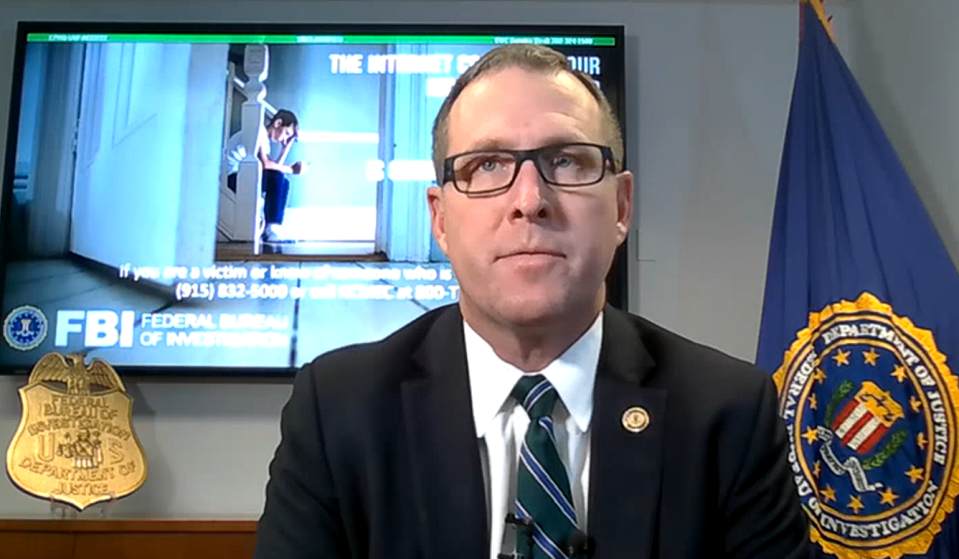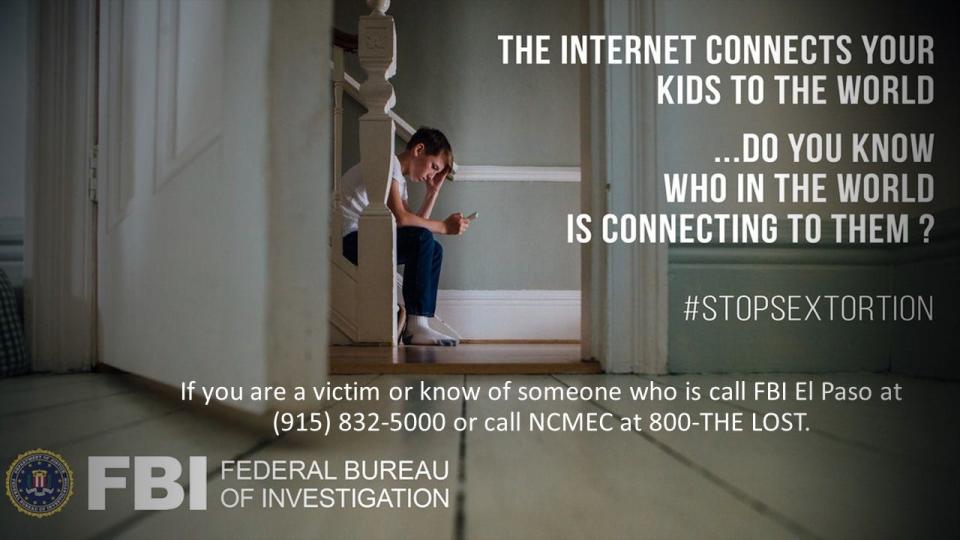FBI warns of increase in sextortion cases targeting children in El Paso
An alarming increase in sextortion cases targeting children is being seen in the El Paso area, FBI El Paso officials warned.
"We've seen a significant increase in a crime targeting our children, which is called sextortion," FBI El Paso Special Agent in Charge Jeffrey R. Downey said. "This is a criminal act where an adult coerces a child to send them explicit photos or video of them."
In El Paso, FBI officials are "seeing a significant uptick" in people reporting cases of sextortion.
"Right now, we are getting an average of about five calls a week from victims of sextortion," Downey said. "So, that, to me, that's a big number because we haven't seen that in the past. The other piece of that is those are just the ones that are coming forward.

"So, if those are the five victims that are out there that feel comfortable coming forward, I can't imagine and I'm fearful of how many other victims are out there that are afraid to come forward."
Previously, the FBI El Paso would get reports of sextortion "very infrequently," but that has changed, he added.
"They would just trickle in every once in a while, but we were seeing a steady flow of these cases now," Downey said.
Both girls and boys are being targeted by sexual predators, Downey said. The age range of victims is between 14 to 17 years old.
What does sextortion mean?
Sextortion usually begins when a child meets someone online and begins a friendship with that person. The child thinks they are talking to someone their own age, but they are actually talking to a sexual predator pretending to be a child.
More: School threats are no joke: El Paso law enforcement officials warn of serious consequences
"Initially what they think is happening is that they are befriending someone their own age ‒ another juvenile ‒ and they're just sharing photos with each other, but in fact, they're sharing it with an adult," Downey said. "Then what happens is that the children get into this cycle, they can't break out of it."
Sexual predators will use social media, gaming platforms and other online platforms to meet the children, Downey said.
Over the course of the friendship, the sexual predator will ask the child for explicit photos or videos. Once the sexual predator has the photos or videos, the crime does not stop there, Downey said.
"Once that adult gets that explicit photo or video, they do one or two things," Downey said. "They'll encourage the child to keep sending them videos (or images), and if they don't keep sending them the video (or images), they'll threaten to take those videos or images and send them out publicly to their neighbors, friends, school members."
The second thing sexual predators will do is once they get the explicit images or videos, they will then blackmail the children to send the predators money. If the children do not send money, the criminal will then threaten to send the photos to family members, friends or post them online, Downey said.

This creates a cycle in which the sexual predator will continue to threaten the child to get more photos, videos or money, Downey said.
Victims of sextortion are not only impacted physically but also mentally.
"There's a great deal of fear," Downey said. "There's a great deal of shame for the children, which we've seen has caused the children to become suicidal at times and have caused them to commit bodily injury to themselves by cutting themselves. So, mentally, it becomes a very difficult thing for the child to get out of. And oftentimes, they don't want to share that information with their parents."
Don't ignore sextortion
Parents are urged to stay vigilant of their children's online activities and talk to them about online safety, Downey said.
"As parents and as adults, we need to be having frank discussions with our children about being safe online," Downey said. "Kids are getting extorted not only just on online platforms, but through video game platforms as well. We need to be able to talk to our children and let them know that if you share sexually explicit videos or photos, those are online and they're out there forever."
He added: "Bottom line is don't take pictures. Don't take sexually explicit pictures."
More: 'We can't do this alone': El Paso FBI leader talks efforts to fight mass shootings, drugs
What should a victim of sextortion do?
Victims and their parents are asked to report cases of sextortion to the FBI by calling the FBI El Paso Division at 915-832-5000 or the FBI's national tip line at 1-800-225-5324. Tips also can be submitted at tips.fbi.gov."My message to victims is, 'Listen, you're not in trouble,'" Downey said. "'You are a victim of a crime. You have been coerced through deception to do something that you didn't think would elevate to what it truly is.' We want to make sure that we are able to talk to those victims and make sure that we're able to get them help."
Criminals convicted of sextortion can face between 10 years to life in federal prison, Downey said.
"Listen, if you're a sexual predator and you're out there targeting children, I can assure you that the FBI will track you down," Downey said. "We will find you. We will hold you accountable. These are cases that we aggressively investigate. These cases have real impacts on victims, not only today, but will impact them for many, many years."
For more information on sextortion and how to get help, visit fbi.gov/sextortion.
Aaron Martinez may be reached at amartinez1@elpasotimes.com or on Twitter @AMartinezEPT.

This article originally appeared on El Paso Times: FBI warns of increase in sextortion targeting children in El Paso

